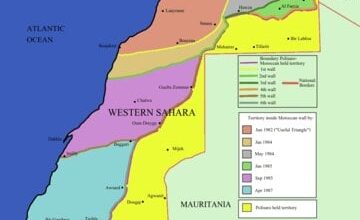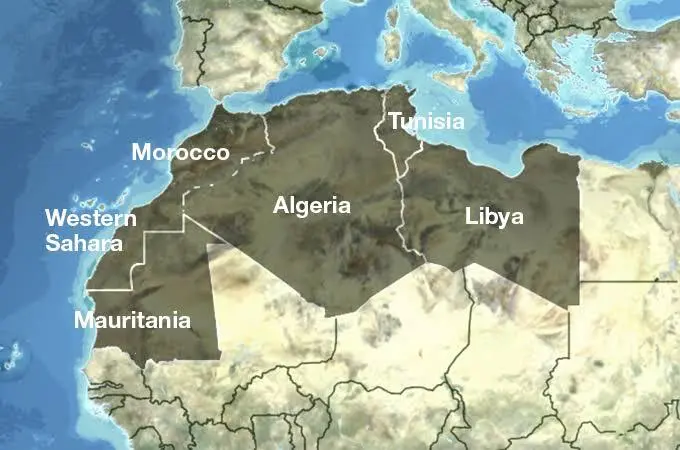
SETTLEMENT OF THE KURDISH PROBLEM IN IRAQ
Discussion and documents on the peaceful and
Democratic settlement of the problem
INTRODUCTION
Late in 1972, “Ath-Thawra” -a central organ of the Arab Baath Socialist Party (ABSP) -carried a series on the serious obstacles impeding the implementation of the peaceful and democratic settlement of the Kurdish problem and jeopardizing relations between the ABSP and the Kurdistan Democratic Party (KDP).
Meanwhile, the paper presented constructive proposals for surmounting difficulties to speed up the implementation of the March Manifesto (This is the agreement on the peaceful and democratic settlement of the Kurdish problem announced by the Revolution Command Council on March 11, 1970) and for restoring the alliance between the two parties on the basis of allegiance to the sovereignty and unity of the country and the dedication to the legitimate national rights of the Kurdish people and to genuine and fruitful cooperation for building a flourishing progressive Iraq.
“Ath-Thawra” ventured upon running that series, which disclosed serious facts and figures that aroused deep alarm and concern both inside and outside the country, with the aim of enriching the dialogue then underway between the two parties and promoting it to the standard of the serious challenges facing the country. Indeed the situation in northern Iraq had presented a mounting danger at a time when the imperialist-Zionist alliance had been escalating its conspiracies against the Arab homeland. It was, therefore, inevitable to call upon the people “To Safeguard Peace and Consolidate National Unity” as mentioned in the title of the series.
Another important motive for publishing those articles was the need to acquaint the people with the real situation in order to further the new democracy, which has now developed into a popular National and Nationalist Progressive Front (NNPF) guided by an agreed-upon National Action Charter, enjoying the full support of the overwhelming majority of the people, and implemented in Iraq to enable the masses to play their decisive role in overcoming all difficulties and defending the aims and gains of the July 17 Revolution.
As a matter of fact, the “Ath-Thawra” series meant to champion the legitimate national rights of the Kurdish people as specified in the March Manifesto, which had been unanimously supported by the people. It also confessed shortcomings on the part of state and ABSP organs and welcomed constructive criticism.
While accentuating the necessity for full understanding and confidence as well as sincere cooperation between the ABSP and the KDP, the paper dealt with the nature and mission of the alliance between the two parties. It stressed the progressive essence of the alliance and showed how it could be revived so that the Kurdish movement could shoulder its responsibility for the development and progress of the entire country. In light of practical experience, the paper pointed out how the KDP assumed the role of the “opposition” instead of acting as a faithful ally and referred to the reactions created by this contradiction.
Dealing with reciprocal commitments under the March Manifesto, “Ath-Thawra” held a comparison between the commitments honored by each party and explained why the remaining commitments had not been attained.
The paper stated the constitutional amendments and the laws enacted to confirm the Kurdish presence and guarantee Kurdish national rights.
In the economic field, the paper showed how special consideration was given to the Kurdish area. It also enumerated the development achieved in the social and cultural spheres.
As to the participation in government by the KDP, “Ath-Thawra” disclosed the whole story and defined the ABSP’s concept of the general basis for the full and equitable participation of the Kurdish movement in accordance with the March Manifesto.
The paper also showed how the administration and the running of local affairs in the Kurdish area had been entrusted to the Kurds themselves.
“Ath-Thawra” exposed the deterioration of the situation in the Kurdish area, pointing out that it had become the scene of dangerous and tragic incidents. It published statistics of the crimes being committed -including burning down villages, murder, robbery, sabotage, etc. –and mentioned facts relating to the hindrance of state organs and the implementation of government programs, including services.
The paper dealt with the relationship between the KDP and the ruling reaction of Iran and warned against the grave consequences of that relationship which menaced the safety and sovereignty of Iraq.
Regarding the implementation of self-rule, the paper unveiled the intransigent attitude of the KDP, particularly towards the population census, which is stipulated in the March Manifesto as indispensable for delineating the autonomous region.
Despite this, the paper presented realistic proposals for the implementation of self-rule and suggested the participation of representatives of other political parties and forces in the ABSP-KDP talks.
This book is a translation of the series run by Ath-Thawra. (Relevant documents are also attached.) An important document is the attached Autonomy Law.
While this book was under printing, Comrade Ahmed Hassan Al-Bakr, Chairman of the Revolution Command Council (RCC) promulgated, on the prescribed date – 11/3/1974 -the Law for Autonomy in the Region of Kurdistan”.
The draft law for autonomy was originally formulated by the ABSP. It enjoyed broad democratic discussion before being finalized and endorsed by the NNPF in light of the outcome of that discussion. On 11/3/1974 Comrade Saddam Hussein, Vice-Chairman of the RCC introduced the draft law to a final meeting called for by the Supreme Committee of the NNPF. The meeting, which was attended by over a thousand progressive national and nationalist personalities, unanimously confirmed the law.
Thus, the Revolution honored its pledge and crowned its devoted efforts for the realization of the legitimate national rights of the Kurdish people by the implantation of the last remaining clause of the March Manifesto –the historic agreement unanimously supported by all citizens.
The forces of goodwill outside the country also hailed the new Autonomy Law, which was spontaneously supported by the people of Iraq.
“ATH- THAWRA”
WHY TO BE FRANK WITH THE MASSES?
Lately, talks began between representatives of the Arab Baath Socialist Party (ABSP) and the Kurdistan Democratic Party (KDP) to study the problems and obstacles encumbering the progress of the peaceful and democratic settlement of the Kurdish question and marring relations between the two parties.
These talks are characterized by frankness and explicitness. It is indeed our belief that telling the whole truth to the masses and acquainting them with all points of view pertaining to the difficulties and matters at issue, will greatly help bring these talks to a successful end. This will also help elevate the talks to the serious standard dictated by the nature of past experience and by the imperialist and reactionary menace converging on the homeland and on its militant national and nationalist forces. Furthermore, such an attitude will, eventually, promote the talks to a mature level that is compatible with the magnitude of the general responsibilities entrusted to both parties.
Hence, keeping the people informed of all developments is a prerequisite to enabling them play their natural role in maintaining peace, cementing national unity, and in defending their progressive and democratic gains.
In our estimation, discussing the Kurdish question, under all circumstances and on all occasions, is always useful; it is rather imperative. This fact remains valid whether the atmosphere is shrouded with clouds of passivity or bright with rays of positive ness. The Kurdish question was, and still is, one of our most outstanding national problems and, therefore, deserves perpetual study and analysis. The very nature of the development of this question and its concomitant host of complications and conjunctures, before and after the March 11th Manifesto calls for more of this attention.
We take this opportunity to admit that, since the declaration of the March Manifesto, we have not treated the question and its pertaining complexities and surroundings in the required scope-contrary to what the masses expected, and insisted upon.
However, it may be good to remind that, prior to the declaration of the March Manifesto, we flanged our doors wide open for the discussion of the Kurdish question, expounded our views quite frankly, projected the obstacles that hindered attaining a peaceful and democratic settlement of the problem and published the gist of the dialogue between our Party and the KDP …reminding of all this, we still find ourselves obliged to explain, now, the reasons that prompted taking such a stand, which contradicted our conviction of the permanent need for open exchange of opinions and overtures regarding all national issues, so that the masses could give the first and final judgment on them.
Excluding limited exceptions impelled by certain circumstances and attitudes, we have observed what amounted to silence since the long period that followed the announcement of the March Manifesto. The point was to put to the test an idea shared by numerous nationalist forces and personalities their argument was this:
“The party leading power should always maintain wisdom, forbearance, and long magnitude. The conjunctures and complications inherent in the Kurdish question demand special consideration and special treatment. Therefore, exchanging opinions through newspapers, however important and useful, is apt, in many cases, to create confusion, complicate matters and to retard the bona fide efforts exerted for the smooth navigation of the ship of the peaceful and democratic solution to the shores of safety.
Frankly speaking, a more than two and a half years trial of that opinion proved it to be invalid. On the one hand, abiding by that idea was one-sided- by the ABSP solely. For al-Taakhi, the KDP newspaper never ceased to pose what it considered as negativism, problems, and obstructions hindering the attainment of the settlement.
Besides, the publications of the KDP similarly dealt with the same subjects. All this was, of course, an expression and interpretation of the attitude of one party-the KDP.
On the other hand, information media abroad also never ceased to talk about the problems facing the Kurdish question. Some of the material they circulated related to cases that actually took place and to statements attributed to leading sources in the KDP; and some were sheer fabrications and lies.
This material (authentic or concocted, quoting real or false sources, forged or true) expressed opinions and attitudes contrary to those of the ABSP and the revolutionary government.
All this motley information found its way, in full or in a parcel, to citizens across newspapers, publications, and broadcasting services. It created and still creates, a vast state of confusion, impairing constructive endeavors for a just settlement far from contributing to paving their way.
In the wake of this eventful experience, it became evident that a candid exchange of opinions does help the elimination of confusion and the elucidation of facts- provided this exchange originates from devotion to the peaceful and democratic solution of the Kurdish question and from a genuine desire to solve all other problems in a fraternal spirit springing out of a deep belief in national unity.
In our opinion, any talk, however frank and far-reaching, should not deviate, in form or substance, from the following principles:
1. Absolute faith in the legitimate rights of the Kurdish people within the framework of the Iraqi Republic and Arab-Kurdish Brotherhood.
2. Absolute faith in the letter and spirit of the March Manifesto, and adherence to it under al, circumstances and conditions.
3. Dedication to the maintenance of maximum understanding and cooperation between the ABSP and the KDP in the sphere of bilateral relations and in common activity within the framework of the ‘National Front’ -as advocated and specified by the ‘National Action Charter’.
Should these principles illuminate their path, any deliberations will surely be positive, at least in their intentions.
On our part, we should like to emphasize not only our positive intentions but also the fact that any idea expressed by us is but a contribution and a point of view presented for scrutiny and discussion. We should also like to affirm that we are always ready to correct any fault committed by us, be it in theory or practice, in order to serve the public interest and the cause of this homeland and its militant people.
Ath-Thawra Publication 19/10/1972
SETTLEMENT OF THE KURDISH PROBLEM IN IRAQ
Discussion and documents on the peaceful and
Democratic settlement of the problem.
To be continued
Published in Athawra and Almoharer
From the archive of Ibrahim Ebeid




